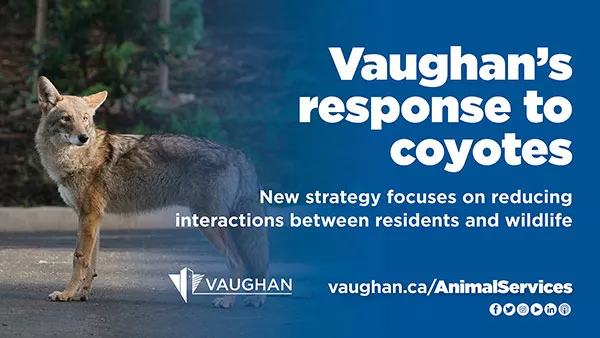Vaughan’s response to coyotes
New strategy focuses on reducing interactions between residents and wildlife
With warmer weather comes more sightings of Vaughan’s urban wildlife – including coyotes. The City of Vaughan has a new plan to address this that outlines response efforts as well as what residents can do to help avoid or reduce interactions with coyotes.
Approved by Members of Council
on April 26, 2022, the Coyote
Response and Coexistence Strategy –includes various types of
education, outreach and investigation for each type of coyote interaction.
Education is key! The actions outlined in this strategy are designed to increase your knowledge and understanding of how coyotes behave and how to manage their behaviour to reduce or eliminate conflicts. Learn more about each of them below.
Be aware
In the spring, coyotes remain pregnant for 60 to 63 days and typically give birth between April and May. The average litter size is four to seven pups. Family size varies depending on habitat, available food sources and human impact. Sightings and encounters with coyotes increase in the spring while they are protecting their den.
It is important to know your surroundings while enjoying nature – keep a safe and respectful distance from wild animals and their dens. Going near wildlife dens is not safe for you or the animals living in them. It is unlawful to disturb or cause distress to wildlife and is subject to a $900 fine.
Coyote sightings in cities and rural areas are common and should not be cause for alarm. The City understands their presence can become a challenge in residential areas and they can also be intimidating to some people.
If you encounter a coyote, keep your distance and keep pets on a short leash. If the coyote approaches you directly:
- stop: pick up children and small pets, if necessary.
- stand your ground: never run from a coyote, fox or domestic dog.
- make yourself big: wave your hands above your head.
- be loud and assertive: shout, stomp your feet and clap your hands.
- use a noisemaker: it could be your voice, pots and pans banged together, a shaker can (such as a pop can filled with pebbles), a plastic bag (pull it out of your pocket and snap it around), or an umbrella popping open and closed.
- slowly back away: be assertive as you leave so the animal knows it is not welcome.
Never feed wildlife
Directly or unintentionally feeding a wild animal will increase its tolerance to people and pets. Reconsider bird feeders as they attract small mammals, which encourage larger wild animals to visit your yard. Feeding animals or leaving food items in parks to attract wildlife is subject to a $500 fine.
Be a responsible pet owner
Always keep dogs on leashes when outdoors and keep cats indoors or in a secure outdoor enclosure. Free-roaming pets are vulnerable to a multitude of dangers. Almost all conflicts between wildlife and domestic dogs occur when dogs are off-leash.
Do not invite unwanted houseguests
Keep your home properly sealed so wildlife stays outdoors. Remove attractants by picking up dog feces, cleaning outdoor grills and securing recycling and compost bins. Only put waste out on collection days, rather than leaving it on the street overnight. Collect and store bins and any uncollected garbage on the same day.
Vaughan Animal Services continues to operate and serve Vaughan, Richmond Hill and the Township of King.
To report a sick or injured wild animal, please call Access Vaughan at 905-832-2281. For more information, go to vaughan.ca/AnimalServices.
For updates and news as they happen, subscribe to Vaughan News and follow the official corporate channels on Twitter, Facebook, Instagram and LinkedIn.
- 30 -

